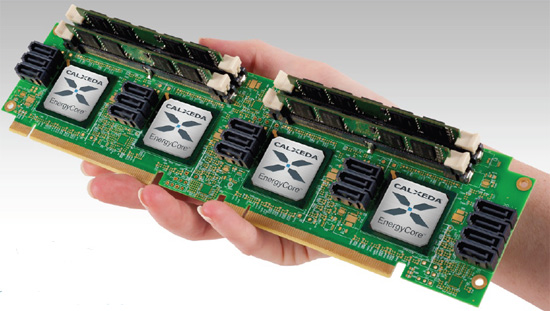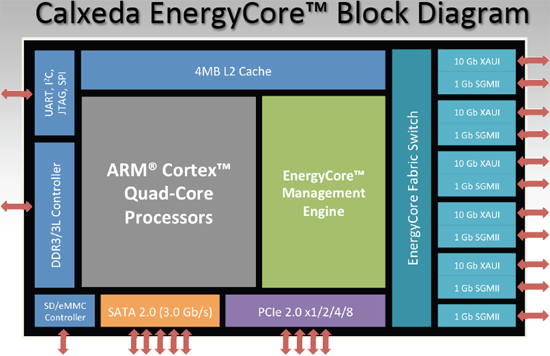Calxeda: ARM-Based Server Shows 15X Better Power Efficiency Than Intel Xeon-Based
Calxeda, a startup developing server-class system-on-chips (SoCs) with ARM cores, has demonstrated power efficiency of web servers based on ARM architecture. Apparently, a machine running on Calxeda's SoC is theoretically fifteen times more energy efficient than a comparable system based on Intel Xeon processor with normal voltage.

Calxeda used similarly configured systems with Ubuntu Server v12.04 (3.2 kernel) and Apache Server v2.4.2 to run ApacheBench v2.3 (16KB request size). Calxeda web server was based on EnergyCore ECX-1000 (four Cortex-A9 cores at 1.1GHz) and featured 4GB DDR3L at 1066MHz, 1Gb Ethernet port and one 250GB 7200rpm Serial ATA hard drive. Intel web-server sported Xeon E3-1240 (four cores with HT at 3.30GHz, 80W TDP) microprocessor, Intel C216 core-logic and 16GB of DDR3 memory.
Power measurements were obtained at a 2-second sampling rate and averaged across the duration of the benchmark run. Power supply overhead and hard drive power consumption were not included in these measurements, however the entire Calxeda EnergyCore ECX-1000 SoC and DDR3 memory are included together.

Based on benchmark results provided by Calxeda, Intel Xeon E3-1240-powered web server processed 26% more requests per second than Calxeda EnergyCore ECX-1000-powered machine and provided lower latency. Nonetheless, average power consumption of ARM server was 5.26W, while Intel web server utilized whopping 102W.

While the results clearly show advantages of Calxeda EnergyCore ECX-1000, the configuration of Intel Xeon-based testbed was not the most power efficient possible. There are quad-core Intel Xeon E3-1200-series chips with 45W TDP, besides, the system could have been configured with 4GB of memory instead of 16GB. Still, even with Xeon E3-1265LV2 (four cores with HT at 2.50GHz with 45W TDP) chip and 4GB of DDR3 memory the system would have consumed around 60W, considerably more than the Calxeda system.
